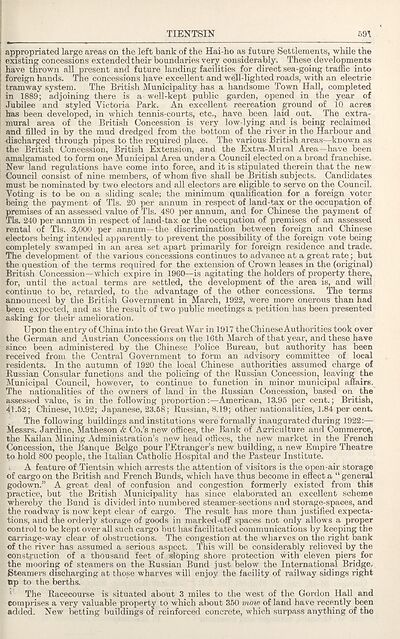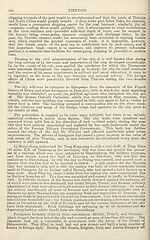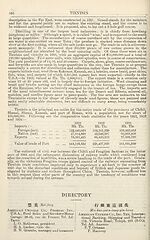1926
(647) Page 591
Download files
Complete book:
Individual page:
Thumbnail gallery: Grid view | List view

TIENTSIN
591
appropriated large areas on the left bank of the Hai-ho as future Settlements, while the
existing concessions extended their boundaries very considerably. These developments
have thrown all present and future landing facilities for direct sea-going traffic into
foreign hands. The concessions have excellent and well-lighted roads, with an electric
tramway system. The British Municipality has a handsome Town Hall, completed
in 1889; adjoining there is a well-kept public garden, opened in the year of
Jubilee and styled Victoria Park. An excellent recreation ground of 10 acres
has been developed, in which tennis-courts, etc., have been laid out. The extra¬
mural area of the British Concession is very low-lying and is being reclaimed
and filled in by the mud dredged from the bottom of the river in the Harbour and
discharged through pipes to the required place. The various British areas—known as
the British Concession, British Extension, and the Extra-Mural Area—have been
amalgamated to form one Municipal Area under a Council elected on a broad franchise.
I New land regulations have come into force, and it is stipulated therein that the new
I Council consist of nine members, of whom five shall be British subjects. Candidates
must be nominated by two electors and all electors are eligible to serve on the Council.
Voting is to be on a sliding scale; the minimum qualification for a foreign voter
being the payment of Tls. 20 per annum in respect of land-tax or the occupation of
premises of an assessed value of Tls. 480 per annum, and for Chinese the payment of
Tls. 240 per annum in respect of land-tax or the occupation of premises of an assessed
rental of Tls. 3,000 per annum—the discrimination between foreign and Chinese
electors being intended apparently to prevent the possibility of the foreign vote being
completely swamped in an area set apart primarily for foreign residence and trade.
The development of the various concessions continues to advance at a great rate; but
the question of the terms required for the extension of Crown leases in the (original)
British Concession—which expir e in 1960—is agitating the holders of property there,
for, until the actual terms are settled, the development of the area is, and will
continue to be, retarded, to the advantage of the other concessions. The terms
announced by the British Government in March, 1922, were more onerous than had
been expected, and as the result of two public meetings a petition has been presented
asking for their amelioration.
Upon the entry of China into the Great War in 1917 the Chinese Author! ties took over
the German and Austrian Concessions on the 16th March of that year, and these have
since been administered by the Chinese Police Bureau, but authority has been
received from the Central Government to form an advisory committee of local
residents. In the autumn of 1920 the local Chinese authorities assumed charge of
Russian Consular functions and the policing of the Russian Concession, leaving the
Municipal Council, however, to continue to function in minor municipal affairs.
The nationalities of the owners of land in the Russian Concession, based on the
assessed value, is in the following proportion;—American, 13.95 per cent.; British,
41.52; Chinese, 10.92; Japanese, 23.58; Russian, 8.19; other nationalities, 1.84 per cent.
The following buildings and institutions were formally inaugurated during 1922:—
Messrs. Jardine, Matheson & Co.’s new offices, the Bank of Aericulture and Commerce,
the Kailan Mining Administration’s new head offices, the new market in the French
Concession, the Banque Beige pour I’Etranger’s new building, a new Empire Theatre
to hold 800 people, the Italian Catholic Hospital and the Pasteur Institute.
, A feature of Tientsin which arrests the attention of visitors is the open-air storage
of cargo on the British and French Bunds, which have thus become in effect a “ general
godown.” A great deal of confusion and congestion formerly existed from this
practice, but the British Municipality has since elaborated an excellent scheme
whereby the Bund is divided into numbered steamer-sections and storage-spaces, and
the roadway is now kept clear of cargo. The result has more than justified expecta¬
tions, and the orderly storage of goods in marked-off spaces not only allows a proper
control to be kept over all such cargo but has facilitated communications by keeping the
carriage-way clear of obstructions. The congestion at the wharves on the right bank
of the river has assumed a serious aspect. This will be considerably relieved by the
construction of a thousand feet of sloping shore protection with eleven piers for
the mooring of steamers on the Russian Bund just below the International Bridge.
Steamers discharging at those wharves will enjoy the facility of railway sidings right
Up to the berths.
' The Racecourse is situated about 3 miles to the west of the Gordon Hall and
Comprises a very valuable property to which about 350 mow of land have recently been
added. New betting buildings of reinforced concrete, which surpass anything of the
591
appropriated large areas on the left bank of the Hai-ho as future Settlements, while the
existing concessions extended their boundaries very considerably. These developments
have thrown all present and future landing facilities for direct sea-going traffic into
foreign hands. The concessions have excellent and well-lighted roads, with an electric
tramway system. The British Municipality has a handsome Town Hall, completed
in 1889; adjoining there is a well-kept public garden, opened in the year of
Jubilee and styled Victoria Park. An excellent recreation ground of 10 acres
has been developed, in which tennis-courts, etc., have been laid out. The extra¬
mural area of the British Concession is very low-lying and is being reclaimed
and filled in by the mud dredged from the bottom of the river in the Harbour and
discharged through pipes to the required place. The various British areas—known as
the British Concession, British Extension, and the Extra-Mural Area—have been
amalgamated to form one Municipal Area under a Council elected on a broad franchise.
I New land regulations have come into force, and it is stipulated therein that the new
I Council consist of nine members, of whom five shall be British subjects. Candidates
must be nominated by two electors and all electors are eligible to serve on the Council.
Voting is to be on a sliding scale; the minimum qualification for a foreign voter
being the payment of Tls. 20 per annum in respect of land-tax or the occupation of
premises of an assessed value of Tls. 480 per annum, and for Chinese the payment of
Tls. 240 per annum in respect of land-tax or the occupation of premises of an assessed
rental of Tls. 3,000 per annum—the discrimination between foreign and Chinese
electors being intended apparently to prevent the possibility of the foreign vote being
completely swamped in an area set apart primarily for foreign residence and trade.
The development of the various concessions continues to advance at a great rate; but
the question of the terms required for the extension of Crown leases in the (original)
British Concession—which expir e in 1960—is agitating the holders of property there,
for, until the actual terms are settled, the development of the area is, and will
continue to be, retarded, to the advantage of the other concessions. The terms
announced by the British Government in March, 1922, were more onerous than had
been expected, and as the result of two public meetings a petition has been presented
asking for their amelioration.
Upon the entry of China into the Great War in 1917 the Chinese Author! ties took over
the German and Austrian Concessions on the 16th March of that year, and these have
since been administered by the Chinese Police Bureau, but authority has been
received from the Central Government to form an advisory committee of local
residents. In the autumn of 1920 the local Chinese authorities assumed charge of
Russian Consular functions and the policing of the Russian Concession, leaving the
Municipal Council, however, to continue to function in minor municipal affairs.
The nationalities of the owners of land in the Russian Concession, based on the
assessed value, is in the following proportion;—American, 13.95 per cent.; British,
41.52; Chinese, 10.92; Japanese, 23.58; Russian, 8.19; other nationalities, 1.84 per cent.
The following buildings and institutions were formally inaugurated during 1922:—
Messrs. Jardine, Matheson & Co.’s new offices, the Bank of Aericulture and Commerce,
the Kailan Mining Administration’s new head offices, the new market in the French
Concession, the Banque Beige pour I’Etranger’s new building, a new Empire Theatre
to hold 800 people, the Italian Catholic Hospital and the Pasteur Institute.
, A feature of Tientsin which arrests the attention of visitors is the open-air storage
of cargo on the British and French Bunds, which have thus become in effect a “ general
godown.” A great deal of confusion and congestion formerly existed from this
practice, but the British Municipality has since elaborated an excellent scheme
whereby the Bund is divided into numbered steamer-sections and storage-spaces, and
the roadway is now kept clear of cargo. The result has more than justified expecta¬
tions, and the orderly storage of goods in marked-off spaces not only allows a proper
control to be kept over all such cargo but has facilitated communications by keeping the
carriage-way clear of obstructions. The congestion at the wharves on the right bank
of the river has assumed a serious aspect. This will be considerably relieved by the
construction of a thousand feet of sloping shore protection with eleven piers for
the mooring of steamers on the Russian Bund just below the International Bridge.
Steamers discharging at those wharves will enjoy the facility of railway sidings right
Up to the berths.
' The Racecourse is situated about 3 miles to the west of the Gordon Hall and
Comprises a very valuable property to which about 350 mow of land have recently been
added. New betting buildings of reinforced concrete, which surpass anything of the
Set display mode to:
![]() Universal Viewer |
Universal Viewer | ![]() Mirador |
Large image | Transcription
Mirador |
Large image | Transcription
Images and transcriptions on this page, including medium image downloads, may be used under the Creative Commons Attribution 4.0 International Licence unless otherwise stated. ![]()
| Asian directories and chronicles > 1926 > (647) Page 591 |
|---|
| Permanent URL | https://digital.nls.uk/196496584 |
|---|
| Attribution and copyright: |
|
|---|---|
| Description | Volumes from the Asian 'Directory and Chronicle' series covering 1917-1941, but missing 1919 and 1923. Compiled annually from a multiplicity of local sources and research. They provide listings of each country's active corporations, foreign residents and government agencies of all nationalities for that year, together with their addresses. Content includes: various treaties; coverage of conflicts; currencies and taxes; consular fees; weights and measures; public holidays; festivals and traditions. A source of information for both Western states and communities of foreigners living in Asia. Published by Hongkong Daily Press. |
|---|---|
| Shelfmark | H3.86.1303 |
| Additional NLS resources: |

